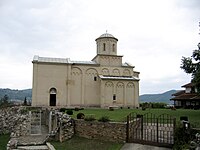Saint Achillius Church (Serbia)
| Church of St. Achillius | |
|---|---|
| Црква Светог Ахилија | |

Church of St. Achillius
|
|
| Coordinates: 43°45′13″N 20°05′47″E / 43.753725°N 20.096284°E | |
| Location | Arilje |
| Country |
|
| Denomination | Serbian Orthodox Church |
| History | |
| Founded | 1296 |
| Founder(s) | Serbian King Stefan Dragutin |
| Dedication | Saint Achillius of Larissa |
| Architecture | |
| Status | Church |
| Functional status | Active |
| Heritage designation | Monument of Culture of Exceptional Importance |
| Designated | 1979 |
| Style | Raška style |
| Specifications | |
| Number of domes | 1 |
| Materials | Stone |
The Church of St. Achillius (Serbian: Црква светог Ахилија), or the Arilje Monastery (манастир Ариље) is a Serbian Orthodox church in Arilje, western Serbia. It is dedicated to Saint Achillius of Larissa, a fighter against Arianism and participant of the First Council of Nicaea in 325. The church was built in 1296 by Serbian King Stefan Dragutin of the Nemanjić dynasty and is located in the center of town, on the elevated plateau above the large river valley and the river Moravica and Big Rzav, and represents the most dominant object in the Arilje region.
The church was built in 1296 by King Stefan Dragutin of the Nemanjić dynasty, on the location of an earlier monastery built in 1219. The earlier monastery was the seat of the Bishop of Moravica, one of twelve eparchies established by Archbishop Sava in 1219.
It is dedicated to Saint Achillius from Larissa (Greece), a fighter against Arianism and participant of the First Council of Nicaea in 325. God made him celebrate victory over Arianism, making a miracle to Achillius confession of the truth water runs from stone.
According to its architectural properties, it belongs to the Raška architectural style, which marked the 13th century, coherent joint processing Romanesque exterior and Byzantine spatial concept. Imaging facade in the style of Byzantine cells unity, construction techniques alternating rows of stone and brick, the wall is finished the Romanesque Saint Achillius Church in Arilje make unique civil engineering in the 13th century of the total area of Byzantine world.
...
Wikipedia

